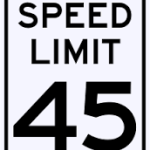Pennsylvania personal injury lawyers warn of the dangers of speeding
 Speed played a factor in many accidents this past week, including a fatal accident in Monroe County. Four children and one adult were killed in a four-vehicle crash on Saturday on Route 115 in Effort, PA. WNEP News reported that none of the children were wearing seat belts or in booster seats at the time of the crash. All of those killed were in the same vehicle, an SUV that hit two other vehicles before flipping on its side. State troopers reported that the driver of the SUV was speeding at the time of the accident.
Speed played a factor in many accidents this past week, including a fatal accident in Monroe County. Four children and one adult were killed in a four-vehicle crash on Saturday on Route 115 in Effort, PA. WNEP News reported that none of the children were wearing seat belts or in booster seats at the time of the crash. All of those killed were in the same vehicle, an SUV that hit two other vehicles before flipping on its side. State troopers reported that the driver of the SUV was speeding at the time of the accident.
Teens in another SUV, in Salt Lake City, Utah, were also believed to be speeding, before their vehicle lost control, went airborne and ended up landing upside down in a river. ABC news aired a video showing bystanders rushing into the river to help the teens, eventually flipping the vehicle over to save the driver from drowning.
In Delaware, a tour bus carrying 50 people was believed to be traveling over the speed limit on an exit ramp when it overturned and slid down an embankment and flipped on its side. The crash killed 2 and injured many others. The bus did not have passenger seat belts. USA Today reported that the bus is owned by AM USA Express in New York City.
According to the National Highway Traffic Safety Administration (NHTSA), speed is involved in about one of three fatal crashes. In 2012, 10,219 lives were lost in speeding-related crashes. 37% of the 15- to 20-year-old males drivers involved in fatal crashes in 2012 were speeding.
The Insurance Institute for Highway Safety (IIHS) reported that speeding has been a factor in about one-third of crash deaths since 2003. In 2012, the percentage of crash deaths involving speeding was higher on minor roads (38%) than interstates and freeways (30%) or on other major roads (27%).
A recent study by the Governor’s Highway Safety Association (GHSA) found that little progress has been made in reducing speeding-related traffic deaths. The GHSA says that despite progress in nearly every other area of highway safety, speeding continues to be a leading cause of crashes.
The GHSA study found that the public’s attitude about speeding is enormously conflicted. They found a large disconnect between the significant majority of people who condemn speeding and the majority of drivers who admit to the behavior, making it a serious challenge to create a safety-conscious environment in which speed limits are respected and obeyed.
The NHTSA’s National Survey of Speeding Attitude and Behavior survey of drivers found that nearly half of those surveyed said speeding is a problem, but that they try to get where they are going as fast as they can.
Following posted speed limits can help you avoid an accident and save lives. Speed limits are specifically designed for each roadway to prevent risks. Driving at safe speeds during bad weather will also help you avoid an accident.
Here are some tips from the personal injury lawyers at Munley Law Personal Injury Attorneys to help you follow the speed limit:
- Check your speedometer regularly.
- Avoid distractions and pay attention to the road and your speed at all times.
- Plan ahead and give yourself plenty of time to get to your destination.
- Set your cruise control to the posted speed limit and change it as the speed limit changes.
- Adjust your speed to changing weather conditions.
If you have been injured in a car, truck or bus accident, the personal injury lawyers at Munley Law Personal Injury Attorneys can help. For a free consultation, call the professionals at Munley Law Personal Injury Attorneys at 855-866-5529.
Posted in Car Accidents.









